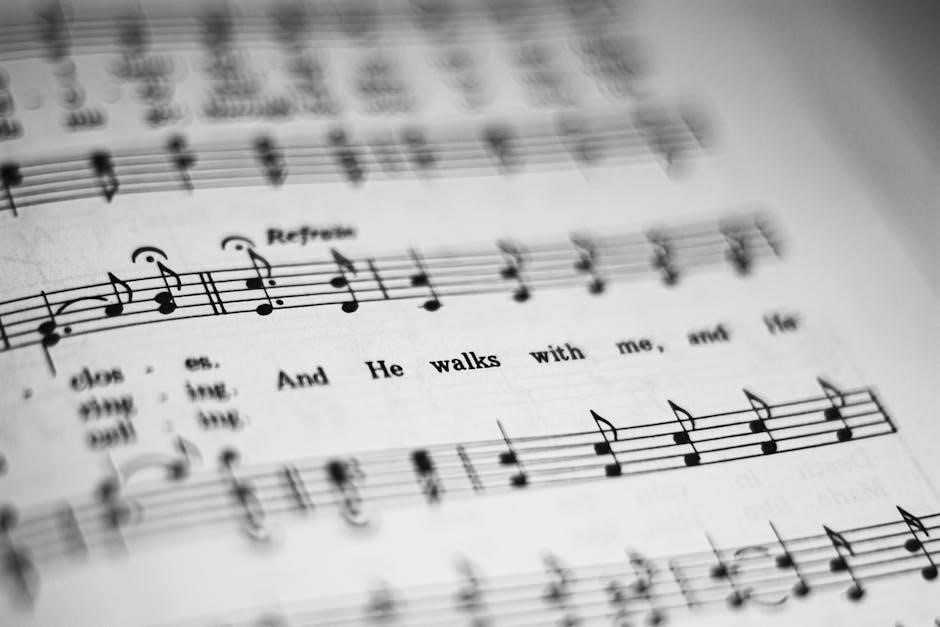La Cucaracha is a traditional Mexican folk song that emerged during the 1910s, gaining popularity during the Mexican Revolution. It humorously tells the tale of a cockroach’s misadventures, blending satire and cultural themes. The song is often associated with Victoriano Huerta and is celebrated for its catchy melody and adaptable verses. English translations and PDF versions are widely available, making it a beloved tune globally.
Historical Background and Origins
La Cucaracha emerged during the Mexican Revolution (1910-1920), created to satirize Victoriano Huerta’s presidency. Its exact origins remain unclear, adding to its historical intrigue.
The Mexican Revolution
La Cucaracha gained prominence during the Mexican Revolution (1910-1920), a period of political upheaval. The song’s origins are linked to this era, reflecting the turmoil and satire of the time. It was often used to mock political figures, particularly Victoriano Huerta, whose controversial leadership and alleged vices were caricatured in its verses. The Revolution’s impact on Mexican culture and music is evident in the song’s enduring popularity, which has led to its adaptation into various languages, including English, and its availability as a free PDF download for global audiences.
Victoriano Huerta and His Influence
Victoriano Huerta, a key figure in La Cucaracha’s history, was a Mexican general and president notorious for his authoritarian rule and personal vices. The song’s lyrics mock his regime, referencing his alleged addiction to alcohol. Huerta’s downfall in 1914 coincided with the song’s rise, making it a symbol of resistance. His influence on the song’s content highlights its role as a political satire tool during the Mexican Revolution. English translations of the song retain these historical references, ensuring Huerta’s legacy remains part of its narrative. The song’s availability in PDF formats has further cemented its cultural and historical significance.
Structure and Verses of the Song
La Cucaracha features multiple verses, often humorous or satirical, with a catchy chorus. Its structure allows for endless adaptations, making it a versatile and enduring folk melody.
Traditional Verses and Their Significance
La Cucaracha is known for its numerous traditional verses, many of which carry satirical or humorous meanings. These verses often reference historical events, like the Mexican Revolution, and political figures such as Victoriano Huerta. The song’s adaptability allows for endless variations, making it a dynamic folk piece. Traditional verses frequently incorporate wordplay and metaphors, reflecting Mexican culture and societal issues. The chorus, with its catchy rhythm, has become iconic, while the verses provide depth and context. Over time, these verses have evolved, but their original intent—to entertain and critique—remains central to the song’s enduring appeal and cultural significance.
English Adaptations and Modifications
La Cucaracha has been adapted into English while preserving its humorous and satirical essence. These adaptations often simplify the lyrics to appeal to a broader audience, maintaining the song’s catchy rhythm. For instance, verses like “The cockroach, the cockroach, can’t walk anymore” retain the original’s playful tone. Some English versions omit politically charged lines, focusing instead on the cockroach’s misadventures. PDF versions of these adaptations are widely available, offering translations that bridge cultural gaps. Despite modifications, the song’s core remains intact, ensuring its timeless appeal across languages and cultures.

English Translation and Lyrics
La Cucaracha has been translated into English, preserving its lively spirit. The lyrics maintain the cockroach’s humorous story, with PDF versions widely available for download, blending tradition with accessibility.
The Process of Translating the Song
Translating La Cucaracha into English required careful adaptation to preserve its cultural nuances and humor. The original Spanish verses, often satirical and historically rich, were reinterpreted to maintain their essence while fitting the English language’s rhythmic and lyrical flow. Many translations focus on the cockroach’s misadventures, ensuring the playful tone remains intact. Sources like Singing Bell and traditional folk arrangements provided inspiration for creating singable and authentic English versions. The process involved balancing creativity with fidelity to the original, ensuring the song’s spirit endured across languages. These translations are now widely available in PDF formats for easy access and enjoyment.
Comparing Spanish and English Versions
The Spanish and English versions of La Cucaracha showcase distinct cultural and linguistic nuances. The original Spanish lyrics often carry political satire and historical references tied to the Mexican Revolution, which can be challenging to convey in translation. English adaptations focus more on the humorous and whimsical aspects of the cockroach’s story, simplifying some verses for broader appeal. While the core melody remains consistent, the translations vary in depth and context, reflecting the difficulties of preserving complex cultural themes across languages. Both versions, however, retain the song’s lively spirit, making it a beloved tune in multiple languages. PDF versions highlight these differences, offering a comparative view for enthusiasts.
Availability of English PDF Versions
English PDF versions of La Cucaracha are widely available online, offering lyrics and sheet music for free download. Websites like Singing Bell and lyricstranslate provide easy access to these resources, perfect for language learners, educators, and music enthusiasts. These PDFs often include both Spanish and English translations, making them versatile for cultural and educational purposes.
Sources for Downloading the PDF
Several websites offer free PDF downloads of La Cucaracha lyrics in English. Platforms like Singing Bell and lyricstranslate provide downloadable versions, often with sheet music and translations. Educational sites specializing in folk songs also offer these resources. Additionally, cultural and language-learning websites include PDFs with both Spanish and English lyrics, making them ideal for learners. These sources ensure easy access to the song’s lyrics and translations, facilitating both musical and educational purposes. Users can search these platforms to find and download the PDF versions conveniently.
Print and Digital Uses of the PDF
The PDF versions of La Cucaracha lyrics in English serve multiple purposes. They can be printed for classroom use, allowing students to follow the lyrics during lessons. Digitally, they can be shared among learners or used in presentations. The PDFs often include sheet music, making them useful for musical performances. Additionally, language learners can benefit from side-by-side Spanish and English translations, enhancing their understanding. These files are versatile tools for education, cultural enrichment, and entertainment, ensuring the song’s accessibility and enduring appeal across various platforms and audiences.

Cultural and Historical Significance
La Cucaracha holds deep cultural and historical significance, reflecting Mexico’s rich heritage. Originating during the Mexican Revolution, it symbolizes satire and resistance, making it a timeless emblem of Mexican identity and folklore.
Role in Mexican Culture
La Cucaracha plays a significant role in Mexican culture, embodying both humor and historical critique. It emerged during the Mexican Revolution, serving as a satirical reflection of political events. The song’s ability to adapt its verses has allowed it to remain relevant across generations. Often performed during celebrations and gatherings, it connects people to their heritage. Its catchy melody and memorable lyrics make it a beloved anthem, symbolizing resilience and cultural identity. The song’s enduring popularity highlights its importance as a cultural artifact, bridging past and present in Mexican society.
Symbolism and Metaphors in the Lyrics
La Cucaracha is rich in symbolism, with the cockroach representing resilience and adaptability. The song’s lyrics often use metaphors to critique political and social issues, particularly during the Mexican Revolution. The cockroach’s missing legs symbolize weakness and instability, reflecting the turmoil of the time. References to Victoriano Huerta and his regime are veiled in humor, while the cockroach’s persistence mirrors the struggles of ordinary people. The song’s verses blend satire with folklore, creating a layered narrative that resonates culturally. Its metaphors transcend time, making it a timeless reflection of human and societal challenges, wrapped in a catchy and memorable tune.

Variations and Adaptations
La Cucaracha has evolved through numerous adaptations, including jazz, rock, and children’s versions. Its verses have been modified to reflect cultural shifts, making it a versatile and enduring tune.
Types of Musical Variations
La Cucaracha has been adapted into various musical styles, including jazz, rock, and children’s lullabies. Its melody has been rearranged for orchestras, mariachi bands, and even electronic music. The song’s versatility allows it to fit diverse genres while retaining its iconic rhythm. Additionally, it has been incorporated into films, cartoons, and educational materials, making it a crossover success. These variations highlight the song’s enduring appeal and its ability to transcend cultural and musical boundaries. The adaptability of La Cucaracha ensures its continued relevance in modern music and education.
Musical Interpretations and Covers
La Cucaracha has been reimagined by numerous artists, spanning genres from jazz to rock. Notable covers include versions by Carlos Santana and mariachi bands, emphasizing its cultural roots. The song’s melody has also been adapted into children’s nursery rhymes and orchestral arrangements, showcasing its versatility. Additionally, modern musicians have created electronic and pop renditions, introducing the tune to new audiences. Its iconic rhythm has been featured in films, animations, and educational content, further cementing its global appeal. These interpretations highlight the song’s enduring popularity and its ability to evolve across generations and musical styles, making it a timeless classic.

Educational Uses and Resources
La Cucaracha is widely used in language classes for Spanish and English learners, offering cultural insights and vocabulary practice. Its PDF versions are popular for classroom activities, enhancing both language learning and cultural education.
Language Learning Through the Song
The La Cucaracha song is a valuable tool for language learners, offering a fun and engaging way to practice Spanish and English. Its repetitive structure and catchy melody make it ideal for memorizing vocabulary and improving pronunciation. Many educational resources, including PDF versions with English translations, provide side-by-side comparisons of the lyrics, helping learners understand linguistic differences. Activities such as sing-alongs and fill-in-the-blank exercises enhance comprehension and retention. Additionally, the song’s cultural context offers insights into Mexican heritage, making it a holistic learning experience. These resources are widely used in classrooms to promote both language skills and cultural awareness.
Cultural Education and Historical Context
La Cucaracha is more than a song; it is a window into Mexico’s rich cultural and historical heritage. Originating during the Mexican Revolution, it reflects the era’s political turmoil and social satire, often referencing figures like Victoriano Huerta. The song’s verses, while humorous, carry deeper meanings tied to the country’s history. English PDF versions with translations and explanations provide learners with insights into the song’s cultural significance. By studying La Cucaracha, students gain a connection to Mexico’s past, understanding its traditions and the context of its creation. This makes it a powerful tool for teaching history, culture, and language in an engaging way.
La Cucaracha stands as a timeless symbol of Mexican culture and history, transcending generations with its catchy melody and satirical lyrics. Its origins in the Mexican Revolution and ties to Victoriano Huerta highlight its historical significance. Available in both Spanish and English PDF versions, the song offers a unique opportunity for cultural and language education. Beyond its humor, it serves as a reminder of Mexico’s vibrant heritage and the power of music to preserve history. Whether for educational purposes or sheer enjoyment, La Cucaracha remains a cherished and enduring piece of global musical tradition.

